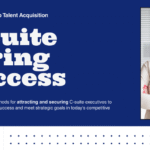Top Skills Senior Executives Must Have in 2025
The business world is evolving at lightning speed, shaped by digital transformation, global market shifts, sustainability demands, and a workforce that values flexibility and inclusivity. For senior executives, the expectations are higher than ever. Their roles are no longer confined to overseeing operations or driving profitability; they must now navigate complexity, inspire innovation, and champion organisational resilience.
As we move into 2025, the definition of effective leadership is changing. Senior executives who succeed will be those who possess not just technical expertise, but also emotional intelligence, adaptability, and a forward-looking mindset. This article explores the top skills senior executives must have in 2025 to remain competitive and impactful.
1. Strategic Agility
The pace of change in business environments means executives can no longer rely solely on long-term, rigid strategies. Instead, they must embrace strategic agility — the ability to pivot quickly when external conditions shift, ensuring they are always prepared for the unpredictable future.
Executives will need to identify opportunities in uncertainty, adapt business models, and take calculated risks while keeping an eye on long-term objectives. Companies led by agile strategists are better equipped to thrive in volatile, uncertain, complex, and ambiguous (VUCA) environments.
2. Digital Fluency
Digital transformation is not slowing down in 2025. Senior executives must go beyond basic digital literacy to develop digital fluency — an in-depth understanding of how emerging technologies like artificial intelligence, blockchain, machine learning, and automation impact business.
This doesn’t mean they need to be coders, but they must recognise how to leverage technology for competitive advantage. Executives who fail to embrace digital innovation risk leaving their organisations behind in the global market.
3. Emotional Intelligence (EQ)
Emotional intelligence has become one of the most critical leadership skills, and its importance will only grow in 2025. Executives must be able to understand, manage, and inspire people effectively, fostering a more connected and empathetic leadership approach.
Strong EQ allows leaders to build trust, resolve conflicts, foster collaboration, and create inclusive work environments. With diverse teams often spread across different cultures and geographies, emotional intelligence helps senior executives maintain cohesion and morale.
4. Global Mindset
The business world is increasingly interconnected. Senior executives must approach leadership with a global perspective, recognising cultural nuances, international regulations, and shifting geopolitical dynamics, to foster a more culturally aware and inclusive leadership style.
A global mindset is not just about expanding markets; it’s about being sensitive to different perspectives and ensuring decisions resonate across diverse regions. Leaders who embrace inclusivity and cultural intelligence will be better positioned to drive growth in multinational organisations.
5. Data-Driven Decision Making
By 2025, data will be an organisation’s most valuable asset. Senior executives must be adept at interpreting data and using analytics to guide decision-making. This requires understanding not only the numbers but also the context and implications behind them.
Data-driven leaders can identify patterns, anticipate trends, and measure performance with precision. This analytical ability helps balance intuition with hard evidence, leading to more innovative business strategies.
6. Innovation and Creativity
Innovation is the lifeblood of organisational success in 2025. Senior executives must champion creativity, not only within product development but also in problem-solving, processes, and customer experiences.
Leaders should foster an environment where employees feel encouraged to experiment, take risks, and learn from failure. Organisations led by innovative executives will be better able to anticipate market needs and stay ahead of competitors.
7. Resilience and Crisis Management
The past few years have highlighted the importance of resilience in leadership. From pandemics to economic instability, senior executives have had to steer organisations through crises while maintaining stability.
In 2025, resilience remains a vital skill. Leaders must not only manage crises effectively but also prepare their organisations to withstand shocks. This requires foresight, adaptability, and a calm, decisive approach in high-pressure situations.
8. Sustainability and Social Responsibility
Sustainability is no longer optional; it’s a business imperative. Customers, investors, and regulators increasingly demand that organisations take responsibility for their environmental and social impact.
Executives must integrate sustainability into their strategies, ensuring their organisations operate ethically while balancing profitability with purpose. This could involve implementing eco-friendly practices in operations, supporting social causes, or developing products with a focus on sustainability. A commitment to social responsibility also enhances brand reputation and builds long-term stakeholder trust.
9. Communication and Storytelling
Great leaders are great communicators. In 2025, senior executives must master the art of storytelling to inspire employees, convince investors, and engage customers.
Beyond simple clarity, storytelling enables executives to communicate vision, values, and strategies in a way that resonates emotionally. Whether speaking at a board meeting, in media interviews, or during team discussions, effective communication ensures alignment and motivation across the organisation. For instance, in a board meeting, a well-crafted story can illustrate the potential impact of a new strategy, while in a media interview, it can humanize the company’s mission and values.
10. Collaboration and Networking
Leadership in 2025 is less about command-and-control and more about collaboration. Senior executives must build strong internal teams while also cultivating external networks with industry peers, policymakers, and stakeholders.
Collaboration drives innovation and knowledge-sharing, while strong networks open doors to new opportunities. Leaders who excel in building relationships are more likely to create sustainable growth and partnerships.
11. Talent Development and Coaching
The workforce of 2025 values growth, flexibility, and purpose. Executives must prioritise talent development, ensuring their teams are future-ready. Rather than simply managing employees, senior executives must act as mentors and coaches.
By investing in employee growth and empowering teams, leaders create loyalty, enhance performance, and reduce turnover. Talent-focused leadership is a defining factor in organisational resilience.
12. Ethical Leadership and Integrity
Trust is the foundation of effective leadership. Senior executives in 2025 must lead with transparency, fairness, and integrity. Ethical leadership involves making decisions that are not only legal and profitable but also morally right. It builds credibility with stakeholders and fosters a culture of accountability within organisations.
In an era of instant information and public scrutiny, integrity is non-negotiable. Executives who consistently demonstrate ethical leadership strengthen their company’s reputation and long-term success.
Conclusion
The expectations of senior executives are shifting rapidly as organisations navigate new realities in 2025. From digital fluency to emotional intelligence, from resilience to sustainability, today’s leaders must possess a unique blend of technical expertise, interpersonal skills, and visionary thinking.
Executives who embrace these skills will not only thrive in their roles but will also shape the future of business, ensuring their organisations remain competitive, responsible, and innovative. The road ahead requires leaders who are adaptable, ethical, and unafraid to challenge the status quo.
In short, the top skills senior executives must have in 2025 are the cornerstone of strong, future-proof leadership in a world defined by change.



